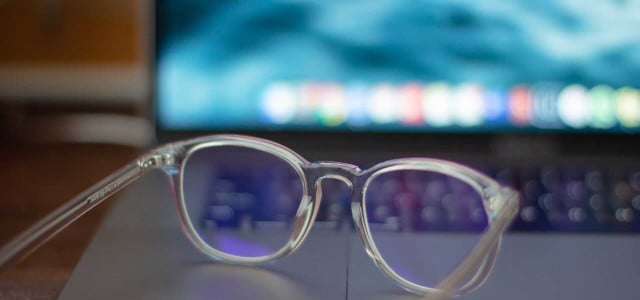
If you spend a lot of time in front of the screen, you can protect your eyes with blue light filter glasses – at least that’s what the manufacturers promise. However, according to a new study, this statement cannot be supported.
To protect the eyes from straining from long periods of screen time, many people use blue light blocking glasses: this reduces the amount of blue light that reaches the eye. According to advertising promises, users could prevent sleep disorders, among other things.
However, a new overview study published in the Cochrane Database of Systematic Reviews shows that there is no scientific evidence for the advertised effects.
Blue light blocking glasses: no proven benefit
The overview study concludes that blue light filter glasses do not affect short-term eye strain compared to conventional glasses. It has also not been proven that they reduce the visual tiredness of the eyes after using a computer. In addition, there was insufficient evidence to make statements about the effects on sleep quality.
In addition, none of the studies analyzed examined the contrast sensitivity or general visual satisfaction of the patient – therefore these effects still have to be scientifically examined.
No statements about long-term effects possible
The aim of the overview study was to examine the possible advantages and safety of blue light blocking glasses. In principle, the Cochrane Research Association intends to analyze the study situation according to strict criteria. A total of 17 studies from six different countries were evaluated, with 619 people being interviewed.
The effects of the glasses were tested over periods of time ranging from one day to five weeks. Overall, however, no statements can be made about the long-term effects of the glasses due to the short observation period, the researchers explain.
Damage from blue light filter glasses?
The scientists emphasize the need for further studies to examine contrast sensitivity, the health of the retina at the back of the eye and sleep quality in more detail, among other things.
As part of their overview study, they also found that blue light filter glasses can also be associated with harmful effects such as headaches or increased depressive symptoms.
However, similar effects would also occur in connection with wearing conventional glasses. The data situation is not sufficient to be able to make reliable statements about negative effects.
Blue light as a wake-up call
According to studies, blue light is considered a stimulant. Because computer screens have more blue light than normal sunlight, prolonged screen time has been linked to eyestrain and sleep disorders. This is where blue light filter glasses come in – according to advertising promises, they can mitigate these effects.
However, vision researcher Michael Bach from the University Hospital Freiburg assures the German Press Agency (dpa): “The amount of blue light that comes from the screen is ridiculously small compared to what you get outside on a sunny day. And that’s what the eye is built for.”
A strain on the eyes after a long screen time is more likely to be due to the fact that those affected look in the same direction or distance for a long time. This overexertion due to looking in the same direction can be compensated for by regularly looking into the distance.
Sources used: Cochrane Database of Systematic Reviews, dpa
Read more on Techzle\.com:
- Germans use economical household appliances – but then they make a mistake
- “Now test again”: Epidemiologist advises caution
- On the move with the 49-euro ticket: Pay attention to the new rule